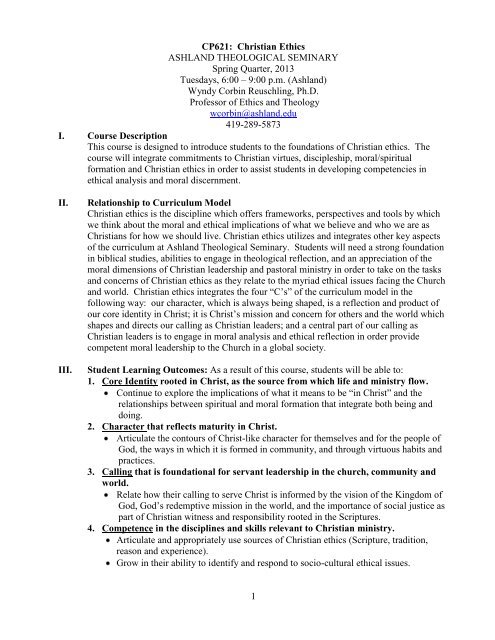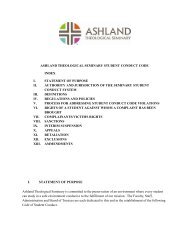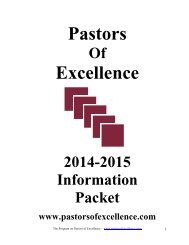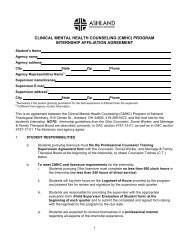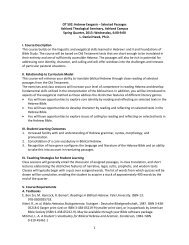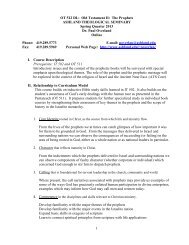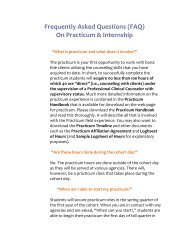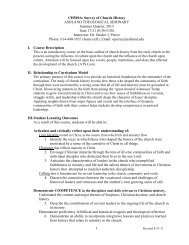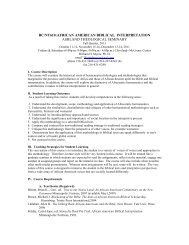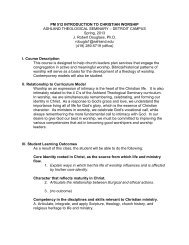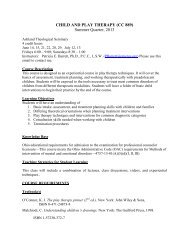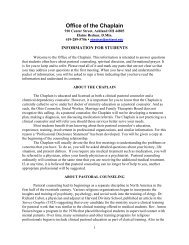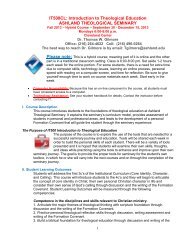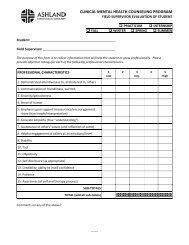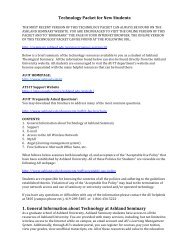Course Number: Course Name - Ashland Theological Seminary
Course Number: Course Name - Ashland Theological Seminary
Course Number: Course Name - Ashland Theological Seminary
Create successful ePaper yourself
Turn your PDF publications into a flip-book with our unique Google optimized e-Paper software.
CP621: Christian EthicsASHLAND THEOLOGICAL SEMINARYSpring Quarter, 2013Tuesdays, 6:00 – 9:00 p.m. (<strong>Ashland</strong>)Wyndy Corbin Reuschling, Ph.D.Professor of Ethics and Theologywcorbin@ashland.edu419-289-5873I. <strong>Course</strong> DescriptionThis course is designed to introduce students to the foundations of Christian ethics. Thecourse will integrate commitments to Christian virtues, discipleship, moral/spiritualformation and Christian ethics in order to assist students in developing competencies inethical analysis and moral discernment.II.III.Relationship to Curriculum ModelChristian ethics is the discipline which offers frameworks, perspectives and tools by whichwe think about the moral and ethical implications of what we believe and who we are asChristians for how we should live. Christian ethics utilizes and integrates other key aspectsof the curriculum at <strong>Ashland</strong> <strong>Theological</strong> <strong>Seminary</strong>. Students will need a strong foundationin biblical studies, abilities to engage in theological reflection, and an appreciation of themoral dimensions of Christian leadership and pastoral ministry in order to take on the tasksand concerns of Christian ethics as they relate to the myriad ethical issues facing the Churchand world. Christian ethics integrates the four “C’s” of the curriculum model in thefollowing way: our character, which is always being shaped, is a reflection and product ofour core identity in Christ; it is Christ’s mission and concern for others and the world whichshapes and directs our calling as Christian leaders; and a central part of our calling asChristian leaders is to engage in moral analysis and ethical reflection in order providecompetent moral leadership to the Church in a global society.Student Learning Outcomes: As a result of this course, students will be able to:1. Core Identity rooted in Christ, as the source from which life and ministry flow.Continue to explore the implications of what it means to be “in Christ” and therelationships between spiritual and moral formation that integrate both being anddoing.2. Character that reflects maturity in Christ.Articulate the contours of Christ-like character for themselves and for the people ofGod, the ways in which it is formed in community, and through virtuous habits andpractices.3. Calling that is foundational for servant leadership in the church, community andworld.Relate how their calling to serve Christ is informed by the vision of the Kingdom ofGod, God’s redemptive mission in the world, and the importance of social justice aspart of Christian witness and responsibility rooted in the Scriptures.4. Competence in the disciplines and skills relevant to Christian ministry.Articulate and appropriately use sources of Christian ethics (Scripture, tradition,reason and experience).Grow in their ability to identify and respond to socio-cultural ethical issues.1
Use thoughtfully the sources and a method of Christian ethical reflection in responseto a particular moral concern in their ministry context.Work toward the integration of theological and ethical commitments with ministrypractices as part of our witness in the world.IV.Teaching Strategies for Student LearningThe professor will utilize a variety of methods to heighten students’ interest in and tofacilitate learning and application of the subject matter. Lectures will provide overarchingthemes and frameworks for discussion. Students are expected to be full participants bycompleting and understanding all assigned readings and coming to each class prepared toparticipate in meaningful and informed conversation with others about the subject matter.Students will participate in a team project and presentation to model Christian moraldiscernment and to provide a response to a specific ethical issue. Through assignments,students will have opportunity to reflect on the course material and to demonstrate their useof the material by applying it to issues they may confront in ministry.A Note About Classroom Etiquette: The ability and willingness to “be fully present” is animportant habit and disposition in ministry where we need to “be fully present” to God,parishioners, clients, counselees, friends, family members, tasks, etc. Please see our courseas an opportunity to practice being fully present to God and to each other by minimizingdistractions and focusing on the tasks at hand. Please bring all of your materials to class.Please turn off cell phones and other devices that connect you with the outside world whilein class. And please resist the temptation to log in, check email, surf the web, and stay onlineon your computers unless asked to do so for our conversations in class. As my eyes goto and fro throughout the class, I reserve the right to ask you to “disconnect” if it seems thattechnology has a distracting, distancing or disruptive effect on you and on others.V. <strong>Course</strong> RequirementsA. TextbooksCorbin Reuschling, Wyndy. Reviving Evangelical Ethics: The Promises and Pitfalls ofClassic Models of Morality. Brazos Press, 2008. ISBN: 978-1-58743-189-0King, Martin Luther. Strength to Love. Fortress Press, 1981. ISBN: 0-8006-1441-0Miles, Rebekah L. The Pastor as Moral Guide. Fortress Press, 1999.ISBN: 0-8006-3136-6Spohn, William. Go and Do Likewise: Jesus and Ethics. Continuum, 2006. ISBN: 0-8264-1291-2Journal Articles and selected chapters (posted on Angel):Birch, Bruce. “Reclaiming Prophetic Leadership,” in Ex Auditu 22, 2006: 10-25.Bruckner, James. “Justice in Scripture,” in Ex Auditu 22, 2006: 1-9.Hays, Richard. “Scripture-Shaped Community: The Problem of Method in New TestamentEthics,” in Interpretation 44, no. 1, January 1990: 42-55.Marga, Amy. “The Ethics of Driving,” in Word and World, Vol. 28, no. 3 (Summer 2008).Marshall, Christopher, D. “Offending, restoration, and the law-abiding community:restorative justice in the New Testament and in the New Zealand experience,”inJournal of the Society of Christian Ethics, 27 no 2 Fall-Wint 2007: 3-30.Moltmann, Jürgen, chapters 1 and 2 from Ethics of Hope. Fortress Press, 2012.2
Srokosz, Meric. “God’s Story and the Earth’s Story: Grounding our concern for theenvironment in the biblical metanarrative,” in Science and Christian Belief 20 no.2, Oct 2008: 163-174.Tanner, Kathryn. “Justification and Justice in a Theology of Grace,” in Theology Today 55,no 4 (Ja 1999): 510-523.B. AttendanceAccording to the student handbook, attendance at all class sessions is expected unless theprofessor has been notified in advance. Any student missing the equivalent of six classhours will be required to do additional work, receive a lower grade or withdraw from theclass; this is at the discretion of the professor. This policy also includes tardiness.C. Assignments/Assessment of Student Learning1. Weekly Preparation Report: The quality and depth of learning in the course isrelated to your investment and willingness to read, process and ask “thick” and probingquestions of the material. Please use the attached form at the end of the syllabus to processyour reading of the material and to demonstrate your preparedness for each class sessionfrom Weeks 2 through 9. Please type your answers on the form (please work to keep it toone-page, with two pages as maximum,) and bring a hard copy to class to submit to theprofessor.Each form is worth 2 points and will factor into the grade you earn for course participation.This assignment will not receive a letter grade but will be evaluated by the followingcriteria:Completion of all assigned reading, demonstrating comprehension of thematerial, important connections made and questions posed – 2 points (√+)Completion of most of the readings with some demonstration of comprehension,connections made and questions posed – 1 point (√)Little or poor demonstration of the reading and/or failure to submit a report – 0points (√-)2. Take-Home Midterm (Normative Task) – Due: May 7 (Week 6)A take-home midterm and specific instructions will be posted to Angel on April 23 and isdue on May 7 by the start of class to the drop box on Angel. The mid-term is designedto give you an opportunity to interact with and apply the course material on the foundationsof Christian ethics for the purpose of establishing normative frameworks for moraldeliberation. The successful completion of the mid-term will depend on yourunderstanding, familiarity and critical interaction with and use of the assigned readingmaterial, the focus of lectures and class discussions from Weeks 1 through 6.3. Team Case Study (Interpretive, Normative, and Practical Tasks) – Due: June 4(Week 10)Over the course of the term, you will be working as a team on a contemporary ethical issue.Topics will be generated in a large group discussion, some will be suggested by theprofessor, and teams will be formed based on interest and equitable distribution of peopleneeded for good, functional teams. The purposes of this team project are as follows:a. To apply the concepts in the course to a specific, contextual ethical issue.b. To develop skills in ethical analysis and reflection.3
c. To participate in and model the role of moral discourse, deliberation and discernment inthe context of Christian community.d. To present transforming initiatives, alternatives and responses from a Christian ethicalperspective.Time will be provided in the context of the class sessions for your team work on this project,but time outside of class may also be necessary. Please attend to the following areas in yourteam work:1. Clear articulation of the moral dimensions of this issue (Interpretative Task): Whyis this a moral concern? What are the layers of this issue? What are the personaldimensions? What are the social dimensions? What virtues are needed (and what virtuesare lacking)? What are the values and “goods” in conflict or at stake? Why is this a concernfor the Church?2. Use of sources in Christian Ethics (Normative Task): How might the Bible addressthis concern? What theological frameworks help in informing this issue? How canChristian tradition help in addressing this issue? What are the insights from reason andexperience that help illuminate the dimensions of this issue? What moral vision fromChristian faith can you hold up to inform your initial response to this moral problem?3. Addressing the Issue(s) (Practical Task): Where will you start in applying moralnorms and claims? What issues will take priority? How will you go about reconcilingand/or addressing competing obligations and duties?4. Proposal(s) for transformation from a Christian ethical perspective (FundamentalTask): What options and alternatives would you propose from the perspective of Christianfaith? How might the Church initiate “transforming initiatives” to address this issue? Whatmodel or alternative can the Church practice? Who “ought we to be” and what “ought we todo?”Please prepare for a group presentation of 20 minutes on Week 10 (June 4). Contingent onclass size, we may need to schedule presentations on Weeks 8, 9 and 10. In order for allgroups to be fairly and equally heard, your group is expected to stick with the 20 minutesallotted for your presentation. The professor will be the time keeper, giving appropriatewarning during the presentations in order for you to finish on time and allow for discussion.You can be creative as you want (or can be!). Presentations may be in the form of role play,debate, question and answer, lecture, group discussion, etc. Your presentations must includea clear articulation of the moral dimensions of this issue, your use of the sources in Christianethics (Bible, theology, tradition, reason and experience), and proposals for transforminginitiatives. The grade earned (10%) will be earned by all team members.4. <strong>Course</strong> Integration Assignment (Interpretive, Normative, Practical and FundamentalTasks):Note: Please submit these assignments to the designated drop boxes on Angel by thedue date listed. You are writing and building this assignment over the quarter. Whenyou submit part “b” on May 21, please also include part “a” and any changes you havemade based on the professor’s feedback. The final copy will include all three sections.The final assignment will provide an opportunity for you to identify and reflect on anexperience in past or present ministry in which you were/are presented with an opportunityfor moral deliberation and ethical action. If you are not able to identify an issue from yourcontext and experience, the instructor will provide you with a case study. You will have4
opportunity to work on this paper throughout the quarter, integrating what you are learningabout the interpretive, normative, practical, and fundamental tasks of Christian ethics withyour own real life work in your case study.a. Interpretive Task—Due April 23: Write up the situation on which you are reflecting,one in which are involved, describing the situation as well as the background and any eventsleading up to it, naming the significant persons (or groups) involved, and any other pertinentfacts. Identify the moral dimensions of the situation such as trigger events; conflictingmoral claims and obligations; harms and goods at stake; moral perceptions; conflicts overChristian identity, character and calling; etc. (4-6 pages)b. Normative and Practical Tasks—Due May 21: You are functioning as “moral guide”(Miles) and prophetic leader (King) in this case study. Describe the ethical resourcesavailable to you in understanding and responding to the situation from a biblical andtheological standpoint. Pay particular attention to the focal images, frameworks andconsiderations you glean from the course readings. Also include any resources in yourcongregational, denominational, or wider Christian tradition for engaging and facing similarsituations. Please submit this section of your paper with the first part (Interpretive Task) asyou continue to revise and edit. (4-6 pages)c. Fundamental Task—Due June 4: If you are writing about a past experience, analyzeand evaluate your response to the situation. What did you learn from the experience? Whatmight you do differently if you face a similar decision in the future? Or, if you are writingabout a present challenge, make an action plan for what you plan to do and what you expector hope to happen. In either case, pay specific attention to Christian practices that areimportant in resolving the situation or in developing virtues of Christian character, and howyou see your role as moral guide (Miles, The Pastor as Moral Guide). What practices werehelpful (or could have been helpful)? How might the congregation (or other Christian body)implement practices that would be helpful to others in similar situations in the future? (2-3pages)Along with the final section of your paper, you will submit a revision of the entire FinalIntegration Assignment, in a typed 10-15 pages double spaced with one inch marginsfollowing the most recent edition of Kate Turabian’s A Manual for Writers.5. Important Reminders: The abilities to organize workloads and schedules, to meetdeadlines and fulfill commitments are important competencies and expectations forChristian leadership and ministry. Therefore, please keep in mind the following:It is expected and assumed that you will turn in assignments on the due dates listedin the syllabus. There is a 2-point deduction for each day an assignment is late.Assignments submitted more than one week late will not be accepted for earningcredit.There will be no extensions or incompletes granted except in extenuatingcircumstances (such as a death in the family).5
D. Calculation of GradeAssignmentClass Participation(includes weeklypreparation form)Learning Percentage of Final GradeOutcomes#2 20%Mid-Term Assignment #1, #2 and #3 30%Team Project #3 and #4 10%<strong>Course</strong> IntegrationAssignment#4 40%VI. <strong>Course</strong> ScheduleWeek # Date(s) Lecture/Topic Readings/AssignmentsWeek 1 April 2 *Introduction*Ethics: Key Concepts,Terminology andFrameworksWeek 2 April 9 *Sources: Scripture andChristian EthicsWeek 3 April 16 *Sources: Theology andChristian EthicsWeek 4 April 23 *Sources: Eschatology andEthics, The Prophets andJesus ChristWeek 5 April 30 *Sources: The Church, ItsWorship, Witness andPracticesWeek 6 May 7 *Concerns of ChristianEthics: Leadership, andMoral Formation of Personsand CommunitiesWeek 7 May 14 *Concerns of ChristianEthics: Justice and Love6Reading: Corbin Reuschling,Introduction and chapter 1; Miles,Introduction; King, chapter 1Reading: Corbin Reuschling, chapter 2;Spohn, chapter 1; King, chapters 2 and 3Journal Article: Hays, “Scripture-Shaped Community”*Weekly Preparation FormReading: Corbin Reuschling, chapter 3;Spohn, chapters 2 and 3; Moltmann,chapters 1 and 2 from Ethics of Hope*Weekly Preparation FormReading: Corbin Reuschling, chapter 4;Spohn, chapters 4, 5 and 6Journal Article: Birch, “ReclaimingProphetic Leadership”*<strong>Course</strong> Integration Assignment:Interpretive Task Due*Weekly Preparation FormReading: Corbin Reuschling, chapter 5and Conclusion; Spohn, chapters 7 and 8*Weekly Preparation Form DueReading: Miles, chapter 1 throughConclusion*Assignment: Mid-term Due*Weekly Preparation Form DueReading: King, chapters 4 - 7Journal Articles: Bruckner, “Justice inScripture”; Tanner, “Justification andJustice in a Theology of Grace”*Weekly Preparation Form DueWeek 8 May 21 *Concerns of Christian Reading: King, chapters 8 - 10
Ethics: Human DignityWeek 9 May 28 *Concerns of ChristianEthics: Care for CreationWeek 10 June 4 *Team Projects, MakingApplications and GoingForwardJournal Article: Marshall, “Offending,Restoration and Law AbidingCommunity”*<strong>Course</strong> Integration Assignment:Normative/Practical Task Due*Weekly Preparation FormReading: King, chapters 11 – 13Journal Articles: Marga, “The Ethics ofDriving”; Srokosz, “God’s Story and theEarth’s Story”*Weekly Preparation FormReading: King, chapters 14 and 15*<strong>Course</strong> Integration Assignment DueVII.Recommendations for Lifelong LearningIn addition to the general sources on Christian Ethics posted on Angel the following arehelpful sources for thinking about the moral dimensions of pastoral practice:Gula, Richard. Ethics in Pastoral Ministry. Mahwah, NJ: Paulist Press, 1996.Keenan, James F. and Joseph Kotva, Practice What You Preach: Virtues, Ethics andPower in the Lives of Pastoral Ministers and Their Congregations. Franklin, WI:Sheed and Ward, 1999.Trull, Joe and James Carter. Ministerial Ethics: Moral Formation for ChurchLeaders. Grand Rapids: Baker Academic, 2004.The following organizations are helpful for understanding bioethical issues and pastoralministry:The Center of Bioethics and Human Dignity (http://www.cbhd.org/index.html)The Hastings Center (http://www.thehastingscenter.org)VIII. <strong>Seminary</strong> GuidelinesA. ATS Academic Integrity Policy<strong>Ashland</strong> <strong>Theological</strong> <strong>Seminary</strong> seeks to model servant leadership derived from biblicalstandards of honesty and integrity. We desire to encourage, develop, and sustain men andwomen of character who will exemplify these biblical qualities in their ministry to thechurch and the world. As members of the seminary community, students are expected tohold themselves to the highest standards of academic, personal, and social integrity. Allstudents, therefore, are expected to abide by the academic integrity standards outlined in theStudent Handbook.B. Academic Support ServicesIf you need assistance with writing projects for your coursework, contact the ATS AcademicSupport Center. The center provides free sessions with a peer consultant who can help youwith all of your concerns about academic support including writing, critical thinking,documentation, reading skills, study skills, test taking skills, time management. Contact thecenter if you have a question about how to complete your assignment, if you havedocumentation questions, or if you would like to have your paper evaluated for areas7
needing improvement. The ATS Academic Support Center can be reached at 419-289-5162or by e-mail at atswc@ashland.edu.C. Students with DisabilitiesStudents with documented disabilities who require academic adjustments for this class arerequested to contact me to discuss reasonable accommodations. While not required, it is inthe best interest of the student to have this conversation early in the semester. In order toreceive academic adjustments paperwork from Disability Services must be provided todocument this need. Disability Services is located in 105 Amstutz, extension 5953 (419-289-5953).D. ATS Grading ScaleGrade Percent DescriptionA 97-100 Superior achievement of course objectives, diligence and originality, high degreeof freedom from error, outstanding evidence of ability to utilize courseknowledge, initiative expressed in preparing and completing assignments,positive contributions verbalized in class.A- 92-96B+ 89-91B 86-88 Good work submitted, commendable achievement of course objectives, someaspects of the course met with excellence, substantial evidence of ability to utilizecourse material, positive contributions verbalized in class, consistency andthoroughness of work completed.B- 83-85C+ 80-82C 77-79 Acceptable work completed, satisfactory achievement of course objectives,demonstrating at least some ability to utilize course knowledge, satisfactory classcontribution.C- 74-76D+ 71-73D 68-70 Passing but minimal work, marginal achievement of course objectives, poorperformance in comprehension of work submitted, inadequate class contributions.D- 65-67F Below 65 Unacceptable work resulting in failure to receive class credit, inadequacy of worksubmitted or of performance and attendance in class.IX. Selected Bibliography or ReferencesA select bibliography is available on Angel.8
Weekly Preparation Form<strong>Name</strong>: _____________________________________________________Session # _________:Reading Completed: _________%Main Points, Synthesis and Connections of the Readings:Questions:9


